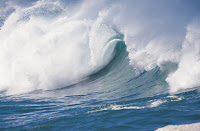
WOW!! I have never seen something so dreadful or sad in my life! We started the day off with some breakfast at our hotel. Then, after breakfast a taxi took us to the most amazing beach in all of Japan called, Saku beach. It was literally amazing! It looked just like one of the beaches in the Hollywood movies. Karli went swimming in the ocean with me, we built sand castles, we played beach volleyball, and we even went surfing! Just after we had our picnic, we were about to go and hit the waves again until Karli said that she saw something far out in the ocean and it was coming towards us! At first I didn't believe her, but then it came closer and I saw it too. It looked like a giant wave, and it was heading right for us! One moment the beach was silent, and the next everyone was running around screaming like crazy maniacs! L
uckily, everyone had gotten away quick enough, and know one was injured. Although the city was very badly damaged. It would take months or maybe even years to repair it. As soon as the destruction was over, we got talking with this man named Ron Quenzies, who wa

s also visiting Japan like us. He was from Australia, but he knew a lot more about Japan than we did. He told us that we had just experienced a real live tsunami, and that they were common in Japan mainly because Japan has so many earthquakes. He also said that there has not been a tsunami that huge for centuries in Japan, although they have small ones all the time! We found out that a tsunami is a series o
f big waves started by a body of water. If there is an earthquake beneath the water, instead of shaking the ground, it will form a tsunami. Ron said that tsunamis can also occur because of landslides, volcano eruptions, explosions, and sometimes even meteorites too. He mentioned that it is very rare that people have even the slightest injury at all. After talking to Ron about tsunamis, Karli invited him back to our hotel for a snack, and so we could find out more info about Japan. After we got back to our hotel room, Ron told us about the Climate in Japan. He told us that Hokkaido is the
 coldest island in Japan. And that in Hokkaido, there is lots of snow in the winter. Plus they have fairly mild summers. He mentioned that in Honshu their summers are very warm, and their winters are quite mild. We also found out that the rest of the islands to the south are tropical islands, they tend to be warm all year round. Like Canada, Spring months in Japan are March, April, and May, and Summer months are June, July, and August. Mr. Quenzies told us that Summers in Japan are usually hot and humid, and that rain only lasts up to 40 days. Ron described how late
coldest island in Japan. And that in Hokkaido, there is lots of snow in the winter. Plus they have fairly mild summers. He mentioned that in Honshu their summers are very warm, and their winters are quite mild. We also found out that the rest of the islands to the south are tropical islands, they tend to be warm all year round. Like Canada, Spring months in Japan are March, April, and May, and Summer months are June, July, and August. Mr. Quenzies told us that Summers in Japan are usually hot and humid, and that rain only lasts up to 40 days. Ron described how late
summer is the season for typhoons and violent tropical hurricanes that bring floods and landslides to Japan. Obviously, Autumn months are September, October, and November, and anywhere from August to October is where typhoon season occurs. In the Winter months, December, January, and February it snows a lot on near the Sea of Japan, and it is dryer near the Pacific Ocean. I couldn't believe how much Japan's climate is similar to Canada's! I thought it would way different, but it's really not. Before Ron left, he told us that great times to travel in Japan might be early or mid-April, mid or late-May, and October or early November. The temperatures are mild, and there is not too much rain at that time. Ron Quenzies said he has had an excellent time, then he gave us both presents and left.
No comments:
Post a Comment